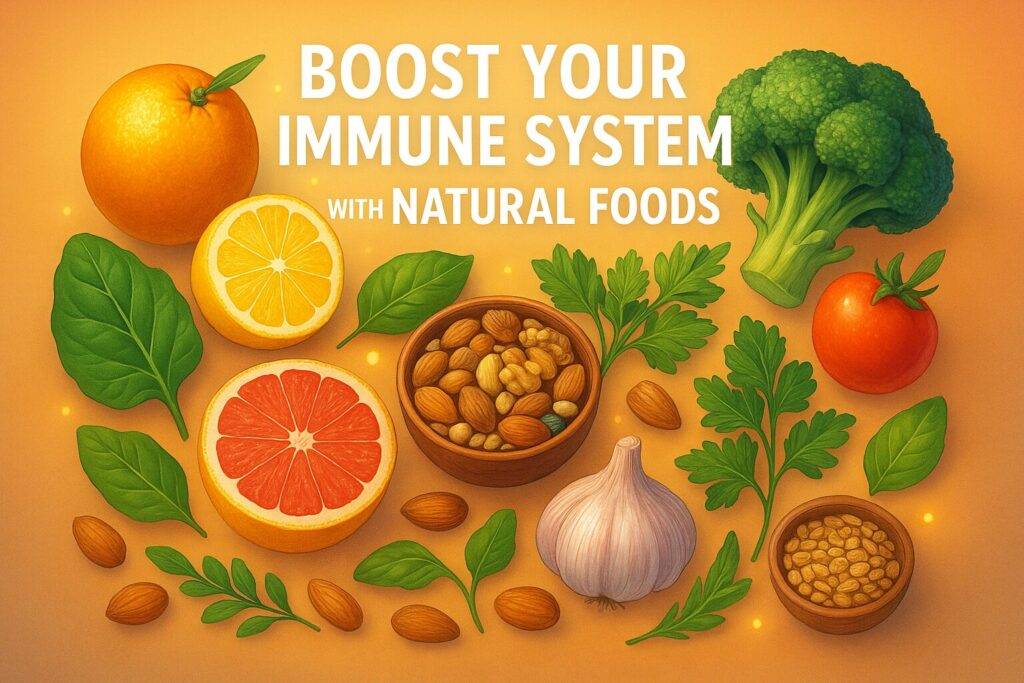Discover how to boost your immune system with natural foods. Learn the top immune-boosting fruits, vegetables, nuts, seeds, herbs, and lifestyle tips for stronger immunity and overall health.
Table of Contents
Introduction: Why a Strong Immune System Matters
A robust immune system is your body’s first line of defense against infections, viruses, and harmful pathogens. It not only helps fight illnesses but also plays a critical role in maintaining overall health, energy levels, and recovery from stress. In today’s fast-paced lifestyle, factors like poor diet, lack of sleep, stress, and environmental toxins can weaken immunity, making it more essential than ever to focus on preventive measures.
Boosting your immune system with natural foods is a scientifically supported approach that harnesses nutrients, antioxidants, and bioactive compounds found in whole foods. Research consistently shows that diets rich in fruits, vegetables, herbs, and probiotics can enhance immune responses, reduce inflammation, and improve overall health outcomes (Harvard T.H. Chan School of Public Health).
By understanding which natural foods provide the most immune support and how they function in the body, you can take practical steps every day to strengthen your defenses. This article will guide you through the top immune-boosting foods, lifestyle habits, and strategies to naturally optimize your immune health.
Top Natural Foods to Strengthen Immunity
Eating a nutrient-rich diet is one of the most effective ways to boost immune system with natural foods. Certain foods contain vitamins, minerals, antioxidants, and bioactive compounds that support immune cell function, reduce inflammation, and protect against infections. Incorporating a variety of these foods into your daily meals can significantly enhance your immune health.
Some of the top natural foods to strengthen immunity include:
- Citrus Fruits: Oranges, lemons, limes, and grapefruits are rich in vitamin C, a key nutrient that stimulates the production of white blood cells, which are vital for fighting infections.
- Berries: Blueberries, strawberries, and elderberries contain flavonoids and antioxidants that help reduce inflammation and strengthen immune responses.
- Garlic: Known for its antibacterial and antiviral properties, garlic contains allicin, a compound shown to boost immune function.
- Leafy Greens: Spinach, kale, and broccoli are packed with vitamins A, C, and E, plus minerals like iron and calcium, which support overall immunity.
- Nuts and Seeds: Almonds, walnuts, sunflower seeds, and pumpkin seeds provide vitamin E, zinc, and healthy fats that are crucial for immune cell function.
- Probiotic Foods: Yogurt, kefir, sauerkraut, and kimchi support gut health, which is closely linked to immune system efficiency.
- Spices and Herbs: Turmeric, ginger, oregano, and cinnamon contain bioactive compounds with anti-inflammatory and antimicrobial properties.
- Green Tea: Rich in antioxidants like EGCG, green tea can enhance the immune response and reduce oxidative stress.
Including a combination of these foods regularly can create a balanced diet that naturally supports your body’s defenses. By focusing on real, whole foods rather than supplements alone, you give your immune system the nutrients it needs to function optimally.
How Citrus Fruits Enhance Your Immune System
Citrus fruits are among the most well-known natural foods to strengthen immunity, primarily due to their high vitamin C content. Vitamin C plays a crucial role in supporting immune function by:
- Stimulating White Blood Cells: White blood cells (lymphocytes and phagocytes) are essential for detecting and attacking pathogens. Vitamin C enhances their production and effectiveness.
- Boosting Antioxidant Protection: Vitamin C neutralizes free radicals in the body, reducing oxidative stress that can impair immune function.
- Supporting Skin Barrier Function: The skin is the body’s first line of defense against infections. Vitamin C contributes to collagen production, maintaining the integrity of skin barriers.
Popular immune-boosting citrus fruits include:
- Oranges and mandarins
- Lemons and limes
- Grapefruits
- Tangerines
Practical tips:
- Start your day with a glass of warm water with lemon to kickstart immunity.
- Add citrus segments to salads, smoothies, or desserts for a nutrient boost.
- For children, consider small portions of fresh orange or mandarin slices to naturally enhance immune health.
Studies have shown that regular intake of vitamin C-rich fruits can reduce the duration and severity of common colds, highlighting their direct benefit in maintaining immune health (Mayo Clinic).
Including citrus fruits consistently in your diet is a simple yet effective way to boost immune system with natural foods and protect your body against infections.
The Role of Garlic and Onions in Immunity
Garlic and onions are time-tested natural foods to strengthen immunity, renowned not only for their flavor but also for their potent medicinal properties. They belong to the allium family and contain sulfur compounds, which have been shown to enhance immune function.
How They Support the Immune System:
- Allicin in Garlic: This bioactive compound exhibits antiviral, antibacterial, and antifungal properties. Allicin can stimulate the activity of immune cells, including macrophages and natural killer (NK) cells, which target pathogens effectively.
- Quercetin in Onions: Onions are rich in quercetin, a flavonoid that acts as a powerful antioxidant and reduces inflammation, helping the immune system respond more efficiently.
- Antimicrobial Benefits: Both garlic and onions can inhibit the growth of certain bacteria and viruses, supporting your body in preventing infections naturally.
Practical Tips:
- Raw vs. Cooked: Raw garlic retains the highest allicin content. Crush or chop it and let it sit for 5–10 minutes before adding to dishes.
- Incorporate Daily: Add chopped onions to salads, soups, and stir-fries. Include garlic in sauces, marinades, or roasted vegetables.
- Supplements: For those who cannot consume raw garlic, standardized garlic supplements can provide similar immune benefits.
Research has indicated that regular consumption of garlic can reduce the incidence of common colds and upper respiratory infections (NIH – National Center for Complementary and Integrative Health).
By adding garlic and onions to your meals, you enhance both flavor and immunity, making them simple yet effective allies in your goal to boost immune system with natural foods.
Leafy Greens and Their Impact on Immune Health
Leafy greens are powerhouse natural foods to strengthen immunity, packed with essential vitamins, minerals, and antioxidants that support immune function. They provide the body with nutrients that are critical for white blood cell production, inflammation control, and overall immune resilience.
Key Immune-Boosting Nutrients in Leafy Greens:
- Vitamin C: Spinach, kale, and Swiss chard are excellent sources that stimulate the production of infection-fighting white blood cells.
- Vitamin A: Found in kale, spinach, and collard greens, vitamin A supports the health of the skin and mucosal barriers, which are your body’s first line of defense.
- Folate: Crucial for the creation and repair of DNA and immune cells, leafy greens like spinach and romaine lettuce are rich in folate.
- Antioxidants: Compounds like lutein and zeaxanthin found in greens help reduce oxidative stress, which can impair immune function.
Practical Tips:
- Daily Intake: Aim for at least 2–3 servings of leafy greens per day, either raw in salads or lightly steamed.
- Smoothies: Blend spinach or kale with fruits for a nutrient-packed immune boost.
- Mix and Match: Combine different greens like arugula, romaine, and bok choy to maximize nutrient diversity.
Scientific studies have shown that diets high in green leafy vegetables correlate with stronger immune responses and reduced risk of chronic inflammation (Harvard T.H. Chan School of Public Health).
Regularly including leafy greens in your meals is a practical and delicious way to naturally support your immune system and overall health.
Probiotics and Fermented Foods for Gut Health
A healthy gut is essential for a strong immune system, as nearly 70% of immune cells are located in the gastrointestinal tract. Probiotics—beneficial bacteria found in fermented foods help maintain a balanced gut microbiome, which directly influences immune responses and protects against infections.
How Probiotics Support Immunity:
- Strengthen Gut Barrier: Probiotics enhance the intestinal lining, preventing harmful pathogens from entering the bloodstream.
- Modulate Immune Response: Beneficial bacteria stimulate the production of antibodies and regulatory T-cells, improving the body’s ability to fight infections.
- Reduce Inflammation: Probiotics help balance pro- and anti-inflammatory responses, which is vital for preventing chronic immune dysfunction.
Immune-Boosting Fermented Foods:
- Yogurt and kefir (rich in Lactobacillus and Bifidobacterium strains)
- Sauerkraut and kimchi (fermented vegetables packed with probiotics)
- Miso and tempeh (fermented soy products that support gut and immune health)
Practical Tips:
- Include Daily: Add a serving of yogurt, kefir, or fermented vegetables to your meals.
- Diversity Matters: Consume a variety of fermented foods to introduce multiple strains of beneficial bacteria.
- Avoid Overly Processed Options: Choose natural, minimally processed fermented foods without added sugars or preservatives.
Research indicates that probiotic-rich diets can reduce the risk and severity of respiratory infections and improve overall immune function (Frontiers in Immunology, 2017).
Incorporating probiotics and fermented foods into your diet is a simple and natural way to boost immune system with natural foods while supporting overall gut health.
Nuts, Seeds, and Their Immune-Boosting Benefits
Nuts and seeds are nutrient-dense natural foods to strengthen immunity, providing a concentrated source of vitamins, minerals, healthy fats, and antioxidants. These nutrients play a crucial role in maintaining immune cell function, reducing inflammation, and protecting the body from oxidative stress.
Key Immune-Boosting Nutrients:
- Vitamin E: Found in almonds, sunflower seeds, and hazelnuts, vitamin E is a fat-soluble antioxidant that helps protect immune cells from damage.
- Zinc: Pumpkin seeds, cashews, and sesame seeds are rich in zinc, which is essential for immune cell development and signaling.
- Healthy Fats: Nuts and seeds contain omega-3 and monounsaturated fats that reduce inflammation and support immune system function.
- Selenium: Brazil nuts are an excellent source of selenium, a trace mineral that enhances antiviral defense and immune response.
Practical Tips:
- Daily Serving: A small handful (about 1–2 ounces) of mixed nuts and seeds can provide a powerful immune boost.
- Snack Smart: Combine almonds, walnuts, and pumpkin seeds for a nutrient-rich snack.
- Add to Meals: Sprinkle seeds on salads, oatmeal, or yogurt for added texture and immune support.
Research has shown that vitamin E and zinc intake from nuts and seeds can enhance immune cell activity and help reduce susceptibility to infections (NIH Office of Dietary Supplements – Zinc).
Incorporating a variety of nuts and seeds into your diet is an easy and effective way to naturally strengthen your immune system and maintain overall health.
Spices and Herbs That Support Immunity Naturally
Spices and herbs are not just flavor enhancers they are powerful natural foods to strengthen immunity. Packed with bioactive compounds, antioxidants, and anti-inflammatory properties, they can help the body fight infections and support overall immune health.
Key Immune-Boosting Spices and Herbs:
- Turmeric: Contains curcumin, a compound with potent anti-inflammatory and antioxidant effects that support immune cell function.
- Ginger: Known for its antimicrobial and anti-inflammatory properties, ginger can help reduce the severity of infections.
- Oregano: Rich in antioxidants and compounds like carvacrol, oregano has antiviral and antibacterial benefits.
- Cinnamon: Contains polyphenols that help modulate immune responses and reduce inflammation.
- Garlic and Cloves: Both have long been used for their antimicrobial and immune-supporting properties.
Practical Tips:
- Daily Use: Add a teaspoon of turmeric or ginger to teas, soups, or smoothies.
- Cooking Benefits: Incorporate oregano, cinnamon, and cloves into meals or spice blends for flavor and immune support.
- Fresh vs. Dried: Fresh herbs often contain higher antioxidant levels, but dried spices are also effective when used regularly.
Scientific studies suggest that these spices and herbs can enhance immune responses by reducing oxidative stress and modulating inflammation, making them excellent additions to a diet aimed at boosting immunity (Frontiers in Pharmacology, 2019).
Including a variety of these herbs and spices in your daily meals is a simple, flavorful, and natural way to boost immune system with natural foods.
Hydration and Its Effect on Immune Function
Proper hydration is a vital but often overlooked component of immune health. Water and other hydrating fluids support every system in the body, including the immune system, by helping transport nutrients, remove toxins, and maintain the optimal function of immune cells.
How Hydration Supports Immunity:
- Nutrient Transport: Water helps deliver essential vitamins, minerals, and antioxidants from immune-boosting foods to cells where they are needed.
- Detoxification: Proper hydration aids the kidneys and liver in flushing out toxins, reducing the immune system’s workload.
- Mucosal Barrier Protection: Staying hydrated maintains the moisture of the respiratory and gastrointestinal tracts, which serve as physical barriers against pathogens.
- Cell Function: Immune cells like lymphocytes and macrophages require a well-hydrated environment to respond effectively to infections.
Practical Tips:
- Drink Water Regularly: Aim for at least 8 glasses (about 2 liters) of water per day, adjusting for activity level and climate.
- Include Herbal Teas: Green tea, ginger tea, or chamomile can provide hydration plus antioxidants that support immunity.
- Hydrating Foods: Consume fruits and vegetables with high water content, such as cucumbers, watermelon, oranges, and leafy greens.
Research highlights that mild dehydration can impair immune responses and reduce the effectiveness of vaccines and immune signaling (European Journal of Clinical Nutrition, 2019).
Maintaining proper hydration is a simple, everyday strategy to naturally support your immune system and complement the immune-boosting benefits of nutrient-rich foods.
Lifestyle Tips to Complement Immune-Boosting Foods
While consuming nutrient-rich natural foods is essential, lifestyle habits play an equally important role in supporting immune health. Combining healthy eating with the right lifestyle practices ensures that your immune system functions at its best.
Key Lifestyle Strategies:
- Prioritize Sleep: Aim for 7–9 hours of quality sleep per night. Sleep deprivation can weaken immune responses and increase susceptibility to infections.
- Manage Stress: Chronic stress elevates cortisol levels, which can suppress immune function. Practices like meditation, yoga, and deep breathing can help maintain immune balance.
- Regular Exercise: Moderate-intensity exercise, such as walking, cycling, or swimming, improves circulation and enhances the activity of immune cells.
- Avoid Smoking and Excess Alcohol: Both can impair immune function and reduce the effectiveness of immune-boosting nutrients.
- Sunlight and Vitamin D: Safe sun exposure helps the body produce vitamin D, a key nutrient for immune cell regulation.
- Maintain Hygiene: Simple habits like handwashing and avoiding contact with sick individuals complement dietary efforts to prevent infections.
Studies show that combining a nutrient-rich diet with proper sleep, stress management, and regular physical activity creates a synergistic effect, improving overall immune resilience (Harvard Medical School).
By integrating these lifestyle habits with immune-boosting foods, you create a holistic approach that naturally strengthens your immune system and promotes long-term health.
Conclusion: Daily Habits for a Stronger Immune System
Boosting your immune system with natural foods is a sustainable and effective approach to maintaining overall health. By consistently including nutrient-rich fruits, vegetables, nuts, seeds, herbs, and probiotics in your diet, you provide your body with the essential vitamins, minerals, and antioxidants it needs to fight infections and reduce inflammation.
Key Takeaways:
- Prioritize Variety: A diverse diet ensures you get a broad spectrum of immune-supporting nutrients.
- Combine Diet with Lifestyle: Adequate sleep, stress management, regular exercise, and proper hydration enhance the benefits of immune-boosting foods.
- Daily Consistency: Small, consistent habits—like adding a handful of nuts, a serving of leafy greens, or a cup of herbal tea each day—can have a significant impact over time.
- Mindful Choices: Opt for whole, minimally processed foods and incorporate herbs and spices for added immune support.
Research consistently confirms that a balanced diet rich in natural foods, coupled with a healthy lifestyle, strengthens immune responses and promotes overall well-being (World Health Organization – Nutrition).
By making these foods and habits a regular part of your routine, you can naturally boost your immune system, protect yourself from illnesses, and enjoy better health for the long term.



